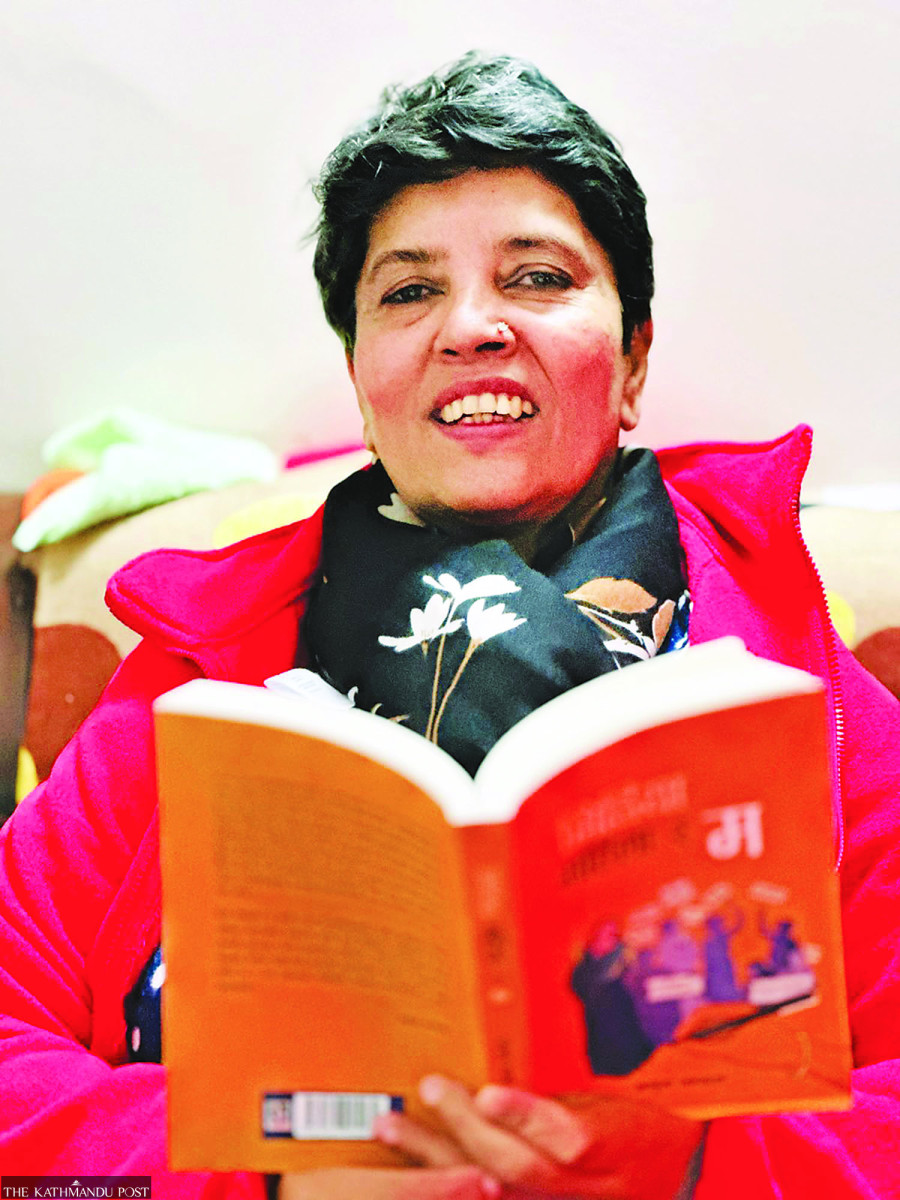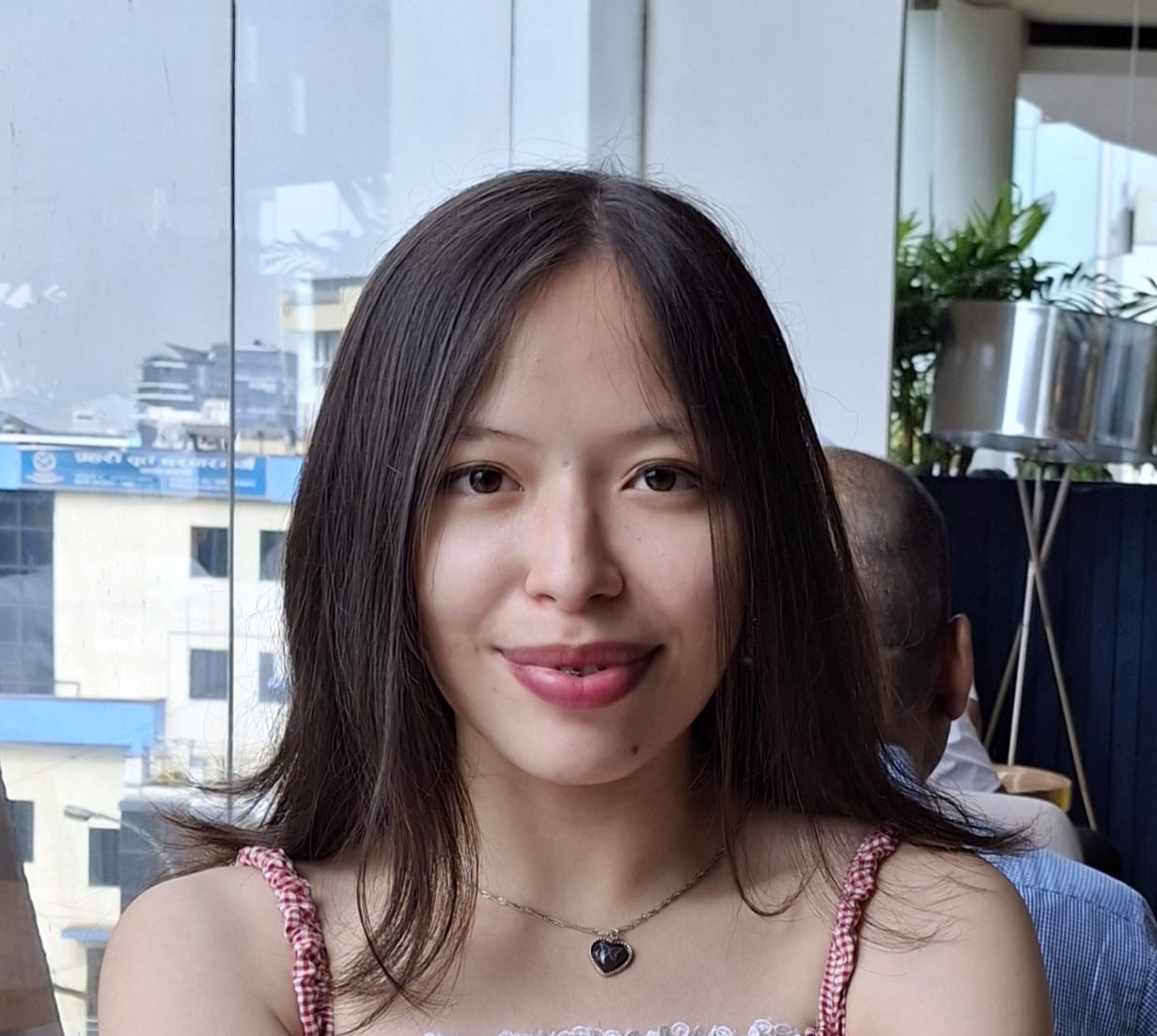Books
Writing is all about reflecting on personal experiences
Amrita Lamsal, a writer and activist, discusses her writing journey, importance of empathy for writers and insights into her writing process.
Manushree Mahat
Amrita Lamsal treats her books like treasure. All of her novels are placed meticulously on her shelves. For her, reading is all about emotional reprieve. She finds utmost pleasure in this simple act, believing it to be a vital part of her life.
As both a writer and activist, Lamsal has contributed to various media outlets, including Onlinekhabar and Setopati. Her works include ‘Hajur Aamaka Katha’, a collection of stories, and her most recent publication, ‘Media, Mahila ra Ma’.
In this interview with the Post’s Manushree Mahat, she talks about her writing journey and emphasises the importance of conveying empathy through her writing.
When did you begin reading?
In my childhood, my father discouraged us from playing sports and instead encouraged us to read books. During that time, I delved into Bal Krishna Sama’s plays and the ‘Mahabharat’, which were readily available and became our go-to reads. A notable aspect of my early years is that my mother was an avid reader. By avid, I mean she would even read brochures if she couldn’t find any books to satisfy her reading appetite.
I come from a family with a literary background—my grandfather was a Sanskrit writer, well-regarded not only in Nepal but also in India. The Indian Embassy would often gift him books, and I would often read them sneakily. Whether it was Mohan Rakesh or Bhagawati Charan, I found myself engrossed in these literary works. I vividly recall reading ‘Lagan’ by Achha Rai ‘Rasik’ when I was around eight or nine years old.
There are books that I find emotionally draining and challenging to read. During my time field reporting amid the Maoist insurgency, I witnessed things that still linger in my memory. That’s why I couldn't muster the strength to read Mohan Mainali’s ‘Mantha Darayeko Jug’—it was too difficult, so I opted to watch the documentary instead.
I got married quite early, almost immediately after completing my SLC. This marked a period when my reading habits took a nosedive, and I stopped reading altogether. However, that doesn’t mean reading wasn’t on my mind. After a few years, I rediscovered my passion for reading and writing. I didn’t set any specific goals for the types of books to explore; I simply read whatever appealed to me at the time. Sometimes, I felt drawn to lighthearted books, while at other times, I sought knowledge from well-researched ones.
Currently, I have a fondness for biographies and books that delve into the reality and personal experiences of individuals. Chitra Banerjee’s ‘Palace of Illusions’ left such a lasting impression on me that the idea of finishing the book saddened me. Over the years, my reading preferences have evolved, and I’ve realised that certain books are too precious to be reread. The initial experience was so delightful, memorable and almost magical that I fear revisiting them might diminish that near-perfect encounter I had with them.
How was writing ‘Hajur Aamaka Katha’ different from ‘Media, Mahila Ra Ma’?
They were both completely different experiences. ‘Hajur Aamaka Katha’ delves into the real stories of my beloved grandmother from her time. Given her recent passing, this book was a tribute to her, driven by the deep connection we shared. I wrote it with her in my heart—she was an incredibly open and sweet woman. Living in different times, I aimed to showcase not only her life but also the struggles faced by women like her during that era.
On the other hand, ‘Media, Mahila Ra Ma’ documents our efforts to address women’s issues in the media. The journey for women’s recognition in the media field is marred by sexism and misogyny, where being published often meant facing complete dismissal of our writing abilities. Even today, the media landscape remains predominantly male-dominated, with stark differences in the attention male and female writers receive. This research-intensive book aims to preserve the history of women in the media, ensuring it doesn’t fade away like much has before. It might not become a bestseller novel, but it holds significant importance as a practical and essential work.
How crucial do you consider empathy in writing?
It’s very important. Despite facing criticism on social media for being labelled a scary radical feminist, my writing is rooted in personal experiences and observations of others. For instance, when I wrote about elderly abuse on Onlinekhabar, many people approached me, sharing that it resonated with their own household experiences.
During my battle with cancer, Hisila Yami visited me at my home, and our conversation turned to gender studies. I admitted not having studied the subject, surprising her. Later, at the launch of 'Media, Mahila Ra Ma', Dr Sucheta Pyakurel, one of the speakers, noted similarities between my writings and gender studies theories. These weren’t academic learnings; they were reflections of my experiences. The fact that they not only resonated with people but also mirrored academic theories underscores how a personal touch can truly transform a book.
How important do you consider formal education in writing?
As I mentioned earlier, my formal education concluded with marriage. It was only when I started working at Rastra Bank that I felt the need for education, so I obtained a BA from a private institution. However, when it comes to my writing, a formal education and degree have never been necessary. I’ve relied on my personal experiences and observations.
These observations not only play a significant role in writing but also in shaping one’s perspective on life. I recall a time when my son and I watched ‘Hijo Aaja Ka Kura’ featuring Santosh Pant. My son later informed me, with innocent astonishment, that Santosh Pant’s daughter had been set on fire. This incident made me laugh at my son’s innocence but also highlighted how observations shape our understanding. We often emulate clothing and shoes seen on TV. While formal education is undoubtedly essential, it’s these seemingly small observations that contribute significantly to shaping our psyche.
What inspires you to keep writing?
I don’t want to sound conceited, but I don’t have specific authors who directly influenced my work. Instead, my motivation to continue writing comes from real-life interactions with people. I recall an instance when my family ordered a birthday cake with ‘Amrita Lamsal’ engraved on it. The cake shop owner recognised me as the person who writes in newspapers and ended up delivering the cake for free. Another time, a taxi driver recognised me during a ride and appreciated my writing. These moments of leaving a positive impact on people inspire me to continue writing and reinforce my commitment to what I do.
Book Recommendations
Palace of Illusions
Author: Chitra Banerjee Divakurni
Year: 2008
Publisher: Doubleday
This book is a retelling of Mahabharata from the perspective of Draupadi. I distinctly remember being so immersed in this book that I was scared of finishing it.
Yajnaseni: The Story of Draupadi
Author: Pratibha Ray
Year: 1984
Publisher: Rupa Publishers
‘Yajnaseni’ was originally written in Odia, and I had the pleasure of reading the translated version in Hindi. It’s a truly wonderful book, and I would recommend it to everyone.
Seto Bagh
Author: Diamond Shumsher Rana
Year: 1973
Publisher: Ratna Pustak Bhandar
Diamond Shumsher Rana’s ‘Seto Bagh’ is a classic that has a special place in my memory. It narrates the life of Jagat Jung, the eldest son of Jung Bahadur Rana.
Long Walk to Freedom
Author: Nelson Mandela
Year: 1994
Publisher: Little Brown and Co
‘Long Walk to Freedom’ is a book that continues to be a favourite of mine. It is an autobiography of Nelson Mandela and provides a glimpse into his struggles. It is an enlightening read.
Smriti Kathama Sattwa
Author: Archana Thapa
Year: 2020
Publisher: Akshar Creations
‘Smriti Kathama Sattwa’ is another favourite of mine. It narrates stories about individuals who have faced oppression and discrimination, shedding light on their experiences.




 9.7°C Kathmandu
9.7°C Kathmandu










